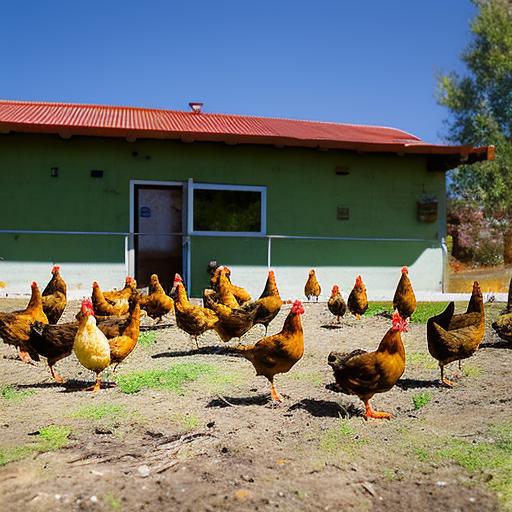Keeping chickens in urban areas has become increasingly popular in recent years, and San Jose is no exception. Many people are drawn to the idea of having their own flock of chickens for a variety of reasons. Not only do chickens provide a sustainable source of fresh eggs, but they also offer the opportunity to connect with nature and live a more self-sufficient lifestyle.
One of the main benefits of keeping chickens in San Jose is the ability to have a constant supply of fresh eggs. Unlike store-bought eggs, which can be weeks old by the time they reach your kitchen, eggs from backyard chickens are typically laid within the past day or two. This means that they are fresher and often have a richer flavor.
In addition to fresh eggs, keeping chickens can also contribute to sustainable living. Chickens are excellent at recycling kitchen scraps and yard waste into nutrient-rich compost. They also help control pests in the garden by eating insects and other small creatures. By keeping chickens, you can reduce your carbon footprint and create a more sustainable environment.
Key Takeaways
- Keeping chickens in San Jose is a great way to promote sustainable living and have a fresh supply of eggs.
- Legal requirements for keeping chickens in San Jose include obtaining a permit and following zoning regulations.
- Choosing the right breed of chickens for San Jose’s climate is important for their health and egg production.
- Housing and coop requirements for chickens in San Jose include providing adequate space, ventilation, and protection from predators.
- Feeding and watering chickens in San Jose requires a balanced diet and clean water, with occasional treats like fruits and vegetables.
Legal Requirements for Keeping Chickens in San Jose
Before you start keeping chickens in San Jose, it’s important to familiarize yourself with the city’s regulations on poultry keeping. The city has specific rules in place to ensure that chickens are kept in a safe and sanitary manner.
In San Jose, residents are allowed to keep up to four hens on their property, but roosters are not permitted due to noise concerns. There are also minimum setback requirements for chicken coops, which means that they must be located a certain distance from neighboring properties.
To keep chickens legally in San Jose, you will need to obtain a permit from the city. The permitting process involves submitting an application and paying a fee. The fee covers the cost of processing the application and conducting an inspection of your property to ensure that it meets the city’s requirements.
Choosing the Right Breed of Chickens for San Jose Climate
When it comes to choosing the right breed of chickens for San Jose’s climate, there are a few factors to consider. Some breeds are better suited to hot climates, while others are more cold-hardy. It’s important to choose a breed that will thrive in the local climate and be able to withstand the temperature extremes that can occur in San Jose.
One breed that does well in San Jose’s climate is the Rhode Island Red. These chickens are known for their hardiness and ability to tolerate both heat and cold. They are also excellent layers, producing large brown eggs on a regular basis.
Another breed that is well-suited to San Jose’s climate is the Australorp. These chickens are known for their heat tolerance and ability to lay consistently throughout the year. They are also friendly and easy to handle, making them a popular choice for backyard flocks.
Housing and Coop Requirements for Chickens in San Jose
Proper housing and coop requirements are essential for keeping chickens in San Jose. Chickens need a safe and secure space to live, sleep, and lay their eggs. The city has specific regulations in place to ensure that chickens are housed in a way that is both humane and sanitary.
In San Jose, chicken coops must be constructed of durable materials and have a solid roof to protect the chickens from the elements. The coop must also have adequate ventilation to prevent the buildup of moisture and ammonia fumes. Additionally, the coop must be predator-proof, with secure doors and windows to keep out predators such as raccoons and coyotes.
When building or buying a chicken coop in San Jose, it’s important to ensure that it meets the city’s regulations. If you’re building your own coop, be sure to use materials that are safe for chickens and will withstand the elements. If you’re purchasing a pre-made coop, make sure that it meets the city’s requirements and provides enough space for your flock.
Feeding and Watering Chickens in San Jose
Proper feeding and watering are essential for keeping chickens healthy and productive. Chickens have specific dietary needs and require a balanced diet to lay eggs and maintain good health.
In San Jose, chickens can be fed a combination of commercial chicken feed and kitchen scraps. Commercial chicken feed is formulated to provide all of the necessary nutrients that chickens need, including protein, vitamins, and minerals. It’s important to choose a high-quality feed that is appropriate for the age and breed of your chickens.
In addition to commercial feed, chickens can also be fed kitchen scraps such as fruits, vegetables, and grains. However, it’s important to avoid feeding them anything that is toxic or harmful to their health. Some foods that should be avoided include chocolate, onions, garlic, and avocado.
Chickens also need access to clean, fresh water at all times. Water should be provided in a clean container that is large enough for all of the chickens to drink from. It’s important to check the water regularly and clean the container as needed to prevent the buildup of bacteria.
Health and Disease Prevention for Chickens in San Jose

Keeping chickens healthy is essential for their well-being and productivity. There are several steps you can take to prevent diseases and keep your flock in good health.
One of the most important things you can do to keep your chickens healthy is to provide them with a clean living environment. This includes regularly cleaning their coop and nesting boxes, as well as providing them with fresh bedding material. It’s also important to keep their food and water containers clean to prevent the spread of bacteria.
Another important aspect of chicken health is regular veterinary care. It’s a good idea to establish a relationship with a veterinarian who specializes in poultry care. They can provide vaccinations, perform routine health checks, and offer advice on preventing and treating common chicken ailments.
Egg Production and Collection in San Jose
Egg production is one of the main reasons why people choose to keep chickens in San Jose. Chickens typically start laying eggs at around six months of age and will continue to lay throughout their productive years.
To maximize egg production, it’s important to provide your chickens with a balanced diet, plenty of fresh water, and a clean and comfortable living environment. It’s also important to provide them with a quiet and stress-free environment, as stress can reduce egg production.
Collecting eggs should be done on a daily basis to ensure that they are fresh and to prevent them from being damaged or eaten by predators. Eggs should be stored in a cool place, ideally in the refrigerator, until they are ready to be used.
Managing Chicken Waste and Composting in San Jose
Managing chicken waste is an important aspect of keeping chickens in San Jose. Chickens produce a significant amount of waste, including manure and bedding material, which needs to be properly managed to prevent odors and contamination.
One way to manage chicken waste is through composting. Chicken manure is an excellent source of nitrogen for compost, and when combined with carbon-rich materials such as straw or leaves, it can create a nutrient-rich compost that can be used in the garden.
To compost chicken waste, it’s important to create a designated compost pile or bin. The pile should be turned regularly to promote decomposition and prevent odors. It’s also important to keep the compost pile covered to prevent rainwater from leaching out nutrients.
Noise and Odor Concerns for Keeping Chickens in San Jose
One common concern about keeping chickens in urban areas is the potential for noise and odor. However, with proper management, these concerns can be minimized.
To minimize noise from chickens, it’s important to choose breeds that are known for being quiet. Some breeds, such as Silkies and Bantams, are known for their quiet nature and are less likely to disturb neighbors.
To minimize odor, it’s important to keep the chicken coop clean and well-ventilated. Regularly cleaning the coop and removing soiled bedding material can help prevent odors from building up. It’s also important to properly manage chicken waste through composting, as mentioned earlier.
Benefits of Keeping Chickens in San Jose for Sustainable Living
Keeping chickens in San Jose offers a variety of benefits for sustainable living. By keeping chickens, you can reduce your carbon footprint by producing your own food and reducing waste.
Chickens are excellent at recycling kitchen scraps and yard waste into nutrient-rich compost. By feeding them your kitchen scraps, you can divert organic waste from the landfill and create a valuable resource for your garden.
In addition to composting, chickens also help control pests in the garden. They eat insects, slugs, and other small creatures that can damage plants. By keeping chickens, you can reduce the need for chemical pesticides and create a more natural and sustainable garden.
Overall, keeping chickens in San Jose can be a rewarding experience that contributes to sustainable living. By following the city’s regulations and taking proper care of your chickens, you can enjoy fresh eggs and contribute to a more environmentally-friendly lifestyle.
If you’re interested in keeping chickens in San Jose, you may want to check out this informative article on creating a garden chicken coop. It provides valuable insights and tips on how to design and maintain a coop that is both functional and aesthetically pleasing. Whether you’re a beginner or an experienced chicken keeper, this article from Poultry Wizard is a great resource to help you create a comfortable and safe environment for your feathered friends. Read more here.
FAQs
What are the rules and regulations for keeping chickens in San Jose?
San Jose allows residents to keep up to five chickens on their property, as long as they are kept in a secure coop or enclosure and are not allowed to roam freely. Roosters are not allowed within city limits.
Do I need a permit to keep chickens in San Jose?
No, you do not need a permit to keep chickens in San Jose as long as you follow the city’s rules and regulations.
What are the benefits of keeping chickens in San Jose?
Keeping chickens can provide a source of fresh eggs, as well as fertilizer for gardens. Chickens can also be entertaining and educational pets for families.
What are the potential drawbacks of keeping chickens in San Jose?
Chickens can be noisy, and their coop or enclosure may require regular maintenance. Additionally, chickens can attract predators such as raccoons and coyotes, so it is important to ensure their enclosure is secure.
What should I consider before keeping chickens in San Jose?
Before keeping chickens, it is important to consider the amount of space you have available, as well as the time and resources required to care for them. You should also consider your neighbors and whether they may be affected by the presence of chickens.
Meet Walter, the feathered-friend fanatic of Florida! Nestled in the sunshine state, Walter struts through life with his feathered companions, clucking his way to happiness. With a coop that’s fancier than a five-star hotel, he’s the Don Juan of the chicken world. When he’s not teaching his hens to do the cha-cha, you’ll find him in a heated debate with his prized rooster, Sir Clucks-a-Lot. Walter’s poultry passion is no yolk; he’s the sunny-side-up guy you never knew you needed in your flock of friends!







